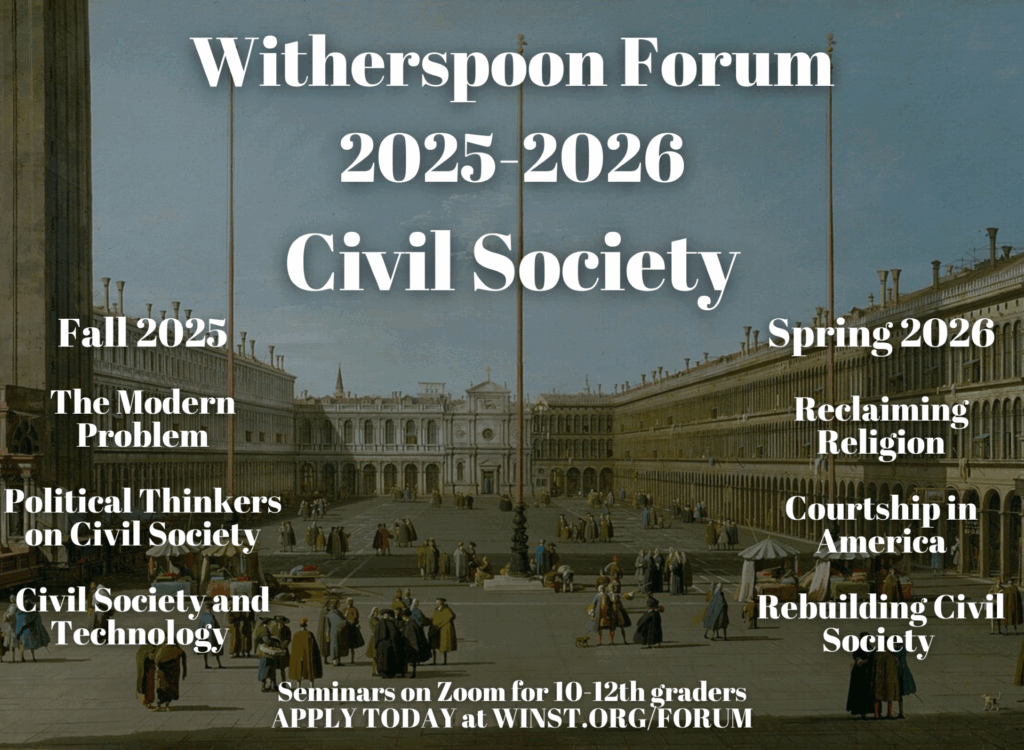The Witherspoon Forum
The Witherspoon Forum provides a space for high school students who are serious about their studies to discuss foundational questions of human existence and contemporary cultural issues in dialogue with their peers and Witherspoon’s seminar leaders.
Each academic year, the Forum features six three-part virtual seminars that explore a common theme through interdisciplinary approaches, including philosophy, theology, political theory, and history. No subject matter expertise is expected, and no grades are assigned. Instead, the Forum seeks to foster rigorous conversation, meaningful reflection on fundamental questions, and intellectual friendship.
Applications are open to students in grades ten, eleven, and twelve. Those who attend three or more seminars throughout the year will receive priority consideration for the Witherspoon Institute’s week-long summer seminar in Princeton, Moral Life and the Classical Tradition.

Civil Society
The Forum’s 2025-2026 theme is “Civil Society.” Throughout the academic year, we will reflect on the most pressing philosophical, theological, and social questions arising from living in an age of a depleted civil society. Our democratic society was once rich with non-government institutions which directly boosted the prosperity of people within their local communities. Town dances, women’s and men’s clubs, bowling leagues, churches, and more were once ubiquitous throughout the country. Some of these institutions have taken on modern forms, but in most cases, they have either disappeared or relocated to online spaces, undermining their effectiveness as social institutions. We will explore how the decline of civil society has reshaped our experience of humanity, democracy, God, and beyond, and what we might be able to do to revitalize civil society.
We will bring key political, philosophical, and religious thinkers into dialogue with contemporary debates on ethics, politics, and culture. What does it mean to be human in an age where much community has moved away from the local toward the digital, or otherwise disappeared? What is the harm as more and more people select their communities based on homogeneity of thought, rather than interact with the authentically diverse group of people who surround them? How might we order our souls and organize our society in a way that aids our flourishing?
Click on the button below to apply:
FALL 2025
The Modern Problem
Led by Mr. Timothy P. Carney
Tuesdays at 7PM EDT–October 7, October 14, and October 21
We know one another less than we used to. We belong to fewer things than we used. We get married less and have fewer children than we used to. Scholars have called it a crisis of civil society. What is “civil society?” Why does it matter? Why is it withering way? What are the consequences?
About Timothy P. Carney:
Mr. Timothy P. Carney is a senior fellow at the American Enterprise Institute, where he works on civil society, family, localism, religion in America, economic competition, and electoral politics. He is concurrently a senior columnist at the Washington Examiner. He has thus far published four books, one of which, Alienated America, is especially relevant to the topic of the current state of civil society in America.
Civil Society and Technology
Led by Dr. Charles Rubin
Tuesdays at 7PM EST–November 4, November 11, and November 18
Long before technologies like social media and AI, Alexis de Tocqueville identified what he called “individualism” as a potential threat to democracy in America. By individualism he meant a tendency for citizens in a democracy to withdraw from the wider civil society into a small circle of family and friends. When we see some of consequences attributed to social media and AI today, e.g. information bubbles, loneliness, social awkwardness, are we seeing a version of individualism? Are technologies that allow us increasing choice of those we interact with so popular precisely because they appeal to our individualist tendencies? Do the institutions and practices that Tocqueville thought might counteract individualism still have that power today, or, given those novel technologies, do we need to look for new ways to support a vigorous civil society?
About Dr. Charles Rubin:
Dr. Charles T. Rubin teaches political philosophy at Duquesne University, Pittsburgh. Recent publications focus on converging technologies, and those who believe they should be used to redesign humanity, a topic he discusses in Eclipse of Man: Human Extinction and the Meaning of Progress (Encounter/New Atlantis Books, 2014). In 2017-18 he was a visiting Fellow in the James Madison Program in American Ideals and Institutions, Princeton University, working on a book exploring what classic stories about human-created monsters tell us about the coming age of biotechnology.
Political Thinkers on Civil Society
Led by Dr. Luke Foster
Tuesdays at 7PM EST–November 25th, December 2nd, and December 9th
Loneliness pervades America and the West as a whole. The consequences for individuals, for families, and for politics are corrosive. The art of friendship enriches life. Marital fidelity engenders culture and the next generation. And civic affection fosters national solidarity and makes common action possible. Yet these bonds are hard to cultivate directly; they require freely given commitment. This series examines Alexis de Tocqueville and Roger Scruton, two great thinkers who articulated the prerequisites and good effects of civil society, that realm between the individual and the state so essential for reconciling liberty and authority.
About Dr. Luke Foster:
Dr. Luke Foster is Assistant Professor of Government at Hillsdale College in Washington, D.C. From 2022-24 he was a Postdoctoral Research Scholar at the Center for Citizenship and Constitutional Government at the University of Notre Dame, and from 2020-22 he was a Visiting Research Fellow at Sciences Po Paris. His research and teaching concerns American and French political thought on aristocracy, democracy, and the role of the university in elite formation. He is completing a book manuscript entitled Beyond Meritocracy: The Pursuit of Excellence in America.
SPRING 2026
Reclaiming Religion
Led by Dr. Joseph Vukov
Tuesdays at 7PM EST–January 20, January 27, and February 3
We live in an era in which religious affiliation and participation has declined alongside the decline of civil society. This forum will explore the causes of this decline and offer both theoretical and practical frameworks for reclaiming religion in a meaningful way.
About Dr. Joseph Vukov:
Dr. Joseph Vukov is an Associate Professor in the Philosophy Department at Loyola University Chicago. He is also Associate Director of the Hank Center for the Catholic Intellectual Heritage at Loyola, and an Affiliate Faculty Member in Catholic Studies and Psychology. Nationally, Vukov also serves as the Vice President of Philosophers in Jesuit Education. Vukov’s research explores questions at the intersection of ethics, neuroscience, and philosophy of mind, and at the intersection of science and religion. In 2022, he published Navigating Faith and Science, and in 2023, he published The Perils of Perfection. In Spring 2024, he published Staying Human in an Era of Artificial Intelligence.
Courtship in America
Led by Dr. Janet Madigan
Tuesdays at 7PM EST–February 17, February 24, and March 3
In “The End of Courtship,” Professor Leon Kass notes that “Until what seems like only yesterday, young people were groomed for marriage, and the paths leading to it were culturally well set out, at least in rough outline . . Our grandfathers came a-calling and a-wooing at the homes of our grandmothers, under conditions set by the woman, operating from strength on her own turf.” But roughly 100 years later, “for the first time in human history, mature women by the tens of thousands live the entire decade of their twenties–their most fertile years–neither in the homes of their fathers nor in the homes of their husbands; unprotected, lonely, and out of sync with their inborn nature.”
While courtship in America moved gradually from this norm during the first half of the 20th century, the sexual revolution exploded traditional ideas about marriage and sexuality, leaving in its wake the hookup culture and rising rates of divorce, out of wedlock births, and STD’s, as well as rampant use of pornography, with courtship as a major casualty. Today, most young Americans desire marriage, but are increasingly at sea about when and how to pursue it. While Gen Z Americans are more sexually conservative, they are especially impacted by the technological revolution, and lack the cultural norms that guided earlier generations to understand how marriage and family life are foundational to a life well lived.
In this course, we will examine how the forces of modernity contributed to the decline of courtship and consider how to promote its return in a culture that pushes us toward social isolation.
About Dr. Janet Madigan:
Dr. Janet Madigan teaches Upper School Humane Letters to the 10th and 12th grades at The Wilberforce School in New Jersey. Since receiving her doctorate in political philosophy from the University of Maryland, Dr. Madigan has worked as a lecturer in Princeton University’s Politics Department. A mother of five who homeschooled her children for 15 years, Dr. Madigan firmly believes in the intrinsic connection between faith and reason.
Rebuilding Civil Society
Led by Dr. Elizabeth Corey
Tuesdays at 7PM EDT–March 17, March 24, and March 31
About Dr. Elizabeth Corey:
Dr. Elizabeth Corey joined the Honors Program’s faculty in 2007 and has served as Director since 2015. She has taught courses at Baylor on political science, great texts, and in the Baylor Interdisciplinary Core. She has earned several awards for research and teaching and was a 2016-2017 Robert Novak Journalism Fellow. She writes for First Things and serves on the board of the Institute on Religion and Public Life. She has also published in The Atlantic, The Chronicle of Higher Education, National Affairs, The Wall Street Journal, and in a variety of scholarly journals. During the 2018-19 academic year she was the American Enterprise Institute’s Values and Capitalism Visiting Professor.




